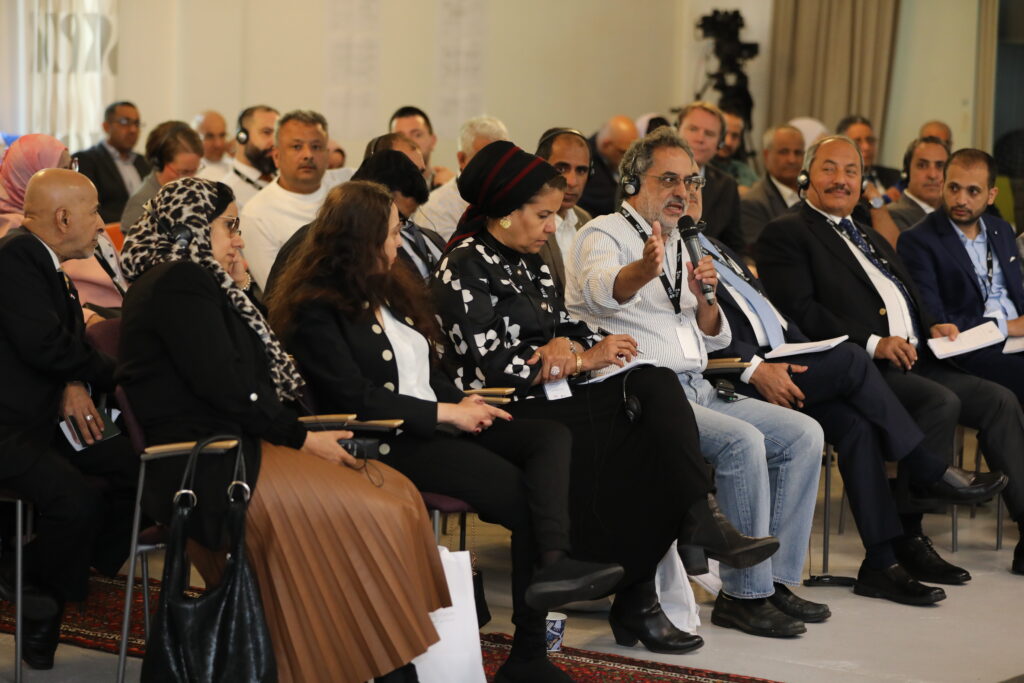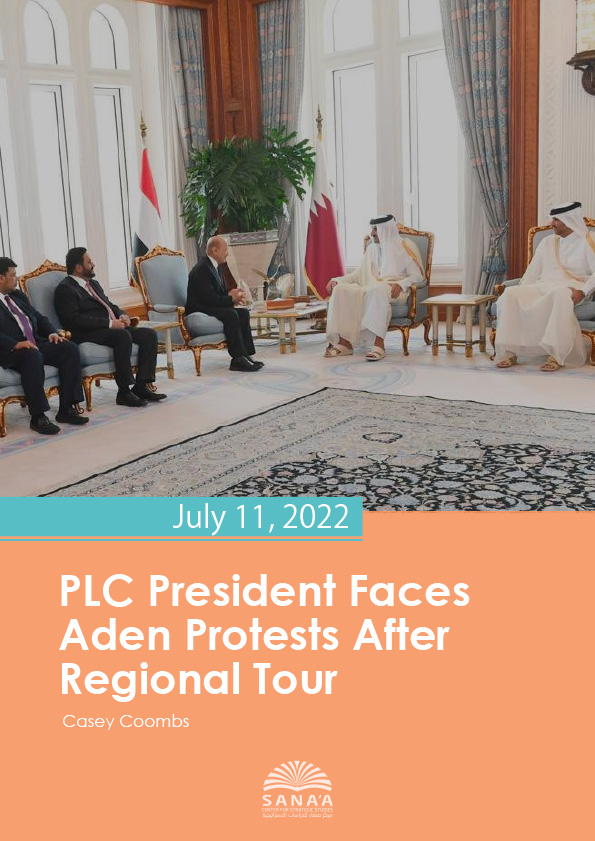Yemen’s Presidential Leadership Council (PLC) secured regional pledges of support during a month-long tour of Gulf states and Egypt that began on June 6, but PLC head Rashad al-Alimi’s diplomatic successes were overshadowed by protests in southern areas. Demonstrations over fuel price hikes and deteriorating basic services shut down parts of Aden, where the Southern Transitional Council (STC) is the dominant power. A notable difference from similar protests in the past was that those in June lacked STC support. The group’s shift in position – and its growing vested interest in maintaining security in the interim capital – appears to have coincided with it becoming a key member of the PLC and working closely with Al-Alimi. The STC alignment with the PLC had its limits, however, with the former publicly accusing officials at the government-affiliated central bank in Aden of conspiring to move the institution to Houthi-controlled Sana’a (see, The Economy & Finance: ‘CBY-Aden Refutes STC Accusation of Planned Return to Sana’a‘), while the security situation in the southern city was further rattled by several assassinations and assassination attempts (see, Military & Security: ‘Journalist, Salafi Commander Killed in Separate Assassinations’).
Delegations of senior officials from the internationally recognized government led by Al-Alimi visited regional allies in Kuwait, Bahrain, Egypt and Qatar in June, seeking to strengthen bilateral relations and secure support for the newly-formed executive body’s agenda, including economic, security and public service reforms.
Outcomes of the PLC’s tour included Kuwait’s appointment of a new ambassador to Yemen, following years of reduced diplomatic representation, and a special envoy to Yemen to manage aid support. Kuwaiti officials said their government is considering ways to support Yemen’s general budget, finance the construction of an electricity station and purchase aircraft for Yemen’s commercial airline, Yemenia. Bahrain’s King Hamad bin Isa al-Khalifa reiterated his support for Yemen’s full membership in the six-member Gulf Cooperation Council, and other Bahraini officials offered to provide support and training to Yemen’s security sector. The head of Egypt’s Al-Azhar University, Ahmed al-Tayeb, pledged to double the number of scholarships to Yemenis and initiate training for Yemeni imams in line with Al-Azhar’s five-year plan to spread its brand of Islam. Egypt’s President Abdel Fattah al-Sisi, following a meeting with several members of the PLC, committed to providing Egyptian expertise to support the development of Yemeni infrastructure, human capital and basic services, notably in the health and electricity sectors. Qatari officials pledged to reopen humanitarian offices in areas controlled by the internationally recognized government and to consider other PLC requests regarding the budget, a power station and flights.
During what state-controlled news agency Saba described as a “private visit” to Saudi Arabia from June 19 to July 6, Al-Alimi met with Saudi Deputy Minister of Defense, Prince Khalid bin Salman, who announced plans to fast-track US$3.3 billion in Saudi-Emirati aid, including 17 new development projects worth $400 million, as well as an additional US$200 million in oil derivatives for power stations. The Saudi Development and Reconstruction Program for Yemen will implement the projects.
On June 6, as the PLC tour began, demonstrators in the Khalf area of Hadramawt governorate closed a main road leading to the port of Mukalla in protest against persistent electricity and water cuts during the scorching summer heat. The barricade, which effectively shut down port and oil facilities, was a culmination of recent frustration over the performance of the authorities in charge of delivering public services. Protests also erupted in Aden later in the month when the Yemen Oil Company raised the price of petrol to 990 Yemeni rials (YR) per liter. Demanding a return to the previous price of YR960, on June 19 residents placed large stones and burning tires on the main street in Mansoura district as well as on the main road at the entrance to Crater district, where many government offices are located.
Although rising fuel prices sparked the protests, the Aden demonstrators used the moment to also demand reforms in the provision of electricity and water and the payment of military and civil servant salaries. On June 21, protesters temporarily closed access to Al-Zayt port in Aden’s western Buraiqa district, preventing the entry and exit of fuel tankers, before Security Belt forces stationed at the facility intervened.
The next day, as dozens of motorists parked their cars to block the coastal road connecting Mansoura and Khor Maksar districts in eastern Aden, Al-Alimi posted several tweets asking protestors to give the PLC more time to implement economic reforms in Aden and other southern governorates. “We will make more efforts to obtain urgent, exceptional assistance from our brothers to alleviate this stifling crisis in the electricity sector, which needs rapid intervention, devoid of the corruption and bureaucracy that hampered previous attempts, as well as attention to creating opportunities and solutions to confront these obstacles.” He continued: “All I ask of you is to give us more time to address the problem and overcome these complex crises; the Council will require the government to carry out its duties in a new way, so that ministers are employees in the service of the people.”
Developments in Houthi-Controlled Territory
Houthis Seize Property of Deceased Political Opponents
Houthi authorities moved to confiscate the homes and assets of three late opponents of the group in June. The Houthi-controlled Supreme National Authority for Combating Corruption (SNACC) ordered the seizure of properties belonging to former Prime Minister Abdelqader Bajamal, a senior member of the General People’s Congress party who died in September 2020. SNACC, which sent the case to prosecutors for the Public Funds Court, accused Bajamal of misusing public funds during his tenure in 2003.
On June 2, Houthi authorities in Sana’a seized the house owned by the late Minister of Parliament Abdelrahman Bafadhel, and evicted his daughter, her husband and their children. Bafadhel, who belonged to the Islamist Islah party, died in Saudi Arabia in October 2015. In mid-June, Houthis raided the house of Ameen Ali al-Kaderi, a deceased tribal leader who opposed Houthi rule in the central governorate of Ibb, according to his son.
Since coming to power in September 2014, the Houthis have seized the property and assets of hundreds of opposition military and security leaders, politicians, journalists and activists. In November 2021, the UN Security Council and the US Treasury Department sanctioned Houthi leader Saleh Misfar Saleh al-Shaer in part for his role as “Judicial Custodian,” in which he has used the Specialized Criminal Court to confiscate more than $100 million worth of funds and assets from the Houthis political opponents.
Social Media Campaign Demands Journalist’s Release
On June 22, activists with the Media Freedoms Observatory launched a social media campaign to pressure the Houthis to release Yemeni journalist Younis Abdelsalam, who has been detained since August 2021. Prior to his detention, Abdelsalam had been suffering from depression stemming from his detention by STC-backed Security Belt forces in Aden in 2020, according to his lawyer, Abdelmajid Sabra. Abdelsalam’s family says his psychological condition has worsened while in Houthi custody, where he has been deprived of access to medication for more than nine months.
International Developments
Yemeni Solutions Debated at First Yemen International Forum
Yemenis representing an array of political perspectives and international and regional delegates gathered in Stockholm, Sweden, June 17-19, for the Yemen International Forum, talking through ideas to resolve political, economic and security challenges in support of peacemaking efforts. The forum, organized by the Sana’a Center in collaboration with the Swedish government’s Folke Bernadotte Academy, was designed to ensure that Yemenis drive the shape of a post-war state so that any agreed-upon peace can be sustained.
To that end, 70 percent of the 250-plus participants were Yemeni, often taking long, convoluted routes from hometowns nationwide to attend. Local and international political and economic experts, diplomats, Yemeni civil society actors and representatives of marginalized communities were among the participants, 36 percent of whom were women. The forum aimed to provide a platform for Yemeni voices, “especially those who were shut down and marginalized as the conflict intensified,” chairman Farea al-Muslimi said in his June 19 closing remarks. “What have we achieved during this record time? We will certainly not reach final and successful solutions, but we have accomplished a preliminary, serious rehearsal for a comprehensive and Yemeni-led dialogue process.”
Parallel sessions over three days worked on building consensus around processes various stakeholders could pursue, especially in the economic realm — where some of the most contentious challenges not only hinder peace efforts but also impact Yemenis’ lives every day. Technical discussions on economic issues tackled Yemen’s fractured monetary environment and divergent exchange rates, liquidity issues, compliance with anti-money laundering and counterterrorism financing measures as well as other banking and public debt challenges. In the political arena, participants discussed how to ensure political parties and civil society are able to positively contribute in the shifting political landscape. Several sessions addressed how to include justice and reconciliation within the peace process. Yemen’s southern leaders in attendance considered how to advance an intra-southern dialogue. Security sessions raised innovative ideas for structuring security and defense forces in a post-war Yemen, viewed as critical to lasting stability, and discussed what groundwork could begin in advance of a negotiated peace.

Key international players in the UN-led peace process also addressed the forum and sought input from participants, including UN special envoy Hans Grundberg, and members of his political, security and economic teams, as well as the US special envoy, Tim Lenderking, Swedish Foreign Minister Ann Linde, the Swedish special envoy for Yemen, Peter Semneby. Also in attendance from the regional side were GCC Ambassador to Yemen, Sarhan Al-Minaikher, and former Egyptian ambassador to Yemen and current ambassador to Sweden, Ahmed Adel Sobhy.
Linde said Sweden was prepared to facilitate peace efforts as needed, and urged international participants to “listen, learn and let the Yemeni-led discussion inform our support going forward.” But in responding to a question about the still-unimplemented elements of the 2018 Stockholm Agreement — related to paying public sector salaries, a full exchange of prisoners and the situation in Taiz — Linde also said Yemeni parties need to take responsibility for missing an opportunity by not following up after the groundwork had been laid. “We would like to support the implementation of what’s left from the Stockholm Agreement that has not been implemented, and we also see it as a responsibility to be able to host new talks — if you want it. But we cannot organize talks via the United Nations if there is no political will, because then it is meaningless and nothing will ever happen.”
Grundberg spoke of the truce that began in April as the first tangible shift in the war’s trajectory and urged Yemenis and Yemeni leaders nationwide “to envisage what that peace will look like, and the steps — and compromises — that need to be taken to get there.” He noted that Yemen’s pluralistic culture and dynamic internal political debate distinguish it from other countries, and urged delegates to engage seriously on Yemen’s future: “One of the most important costs of this war is killing the political debate, which has to come back to the floor and to Yemen.”
Al-Muslimi noted plans for follow-up discussions and future such forums to build on the work of the 2022 forum, saying efforts would continue to ensure ever-broadening representation regionally and politically.
Saudi Arabia, GCC Push for Houthi Terrorism Designation
On June 1, senior ministers of the six Gulf Cooperation Council (GCC) countries urged all nations to formally designate the armed Houthi movement a terrorist group and “firmly confront” the spread of drone and missile technology to non-state actors. On June 14, Saudi Arabia added eight individuals and 11 entities to its own terrorism list for supporting Houthi activities.
Negotiations over Taiz Blockade Drag On As Houthis Reject UN Proposal
In the first week of June, delegations from the internationally recognized government and the Houthis resumed negotiations in Amman on the reopening of blockaded roads around Taiz city – the only item of the UN-brokered truce as yet unimplemented.
Following an inconclusive opening round of talks in late May, during which Houthi negotiators offered to reopen a rugged mountain path impassable by cars, UN Special Envoy Hans Grundberg presented a modified proposal to gradually bring the roads back into use. Government negotiators accepted an amended version of the proposal, which included the opening of a main road between the government-controlled city and the Houthi-controlled industrial area of Hawban, three secondary roads proposed by the Houthis and a fifth road in Al-Dhalea governorate. Grundberg addressed the issue with the Houthis’ political council during a three-day visit to Sana’a ending June 9, but on June 21, Houthi authorities notified him of their rejection of the proposal. The group then tweeted that it was willing to open two secondary roads in an initial phase, including the previously rejected donkey and camel path in the mountains. The second road runs from Taiz to Aden through the towns of Al-Sharejah, Karesh and Al-Rahedah in Lahj governorate. A proposed second phase would reopen one of the roads in Grundberg’s proposal, a route in northwest Taiz city running through 60th Street, 50th Street, the Air Defense City and Al-Noor City, in exchange for the government opening the road in Al-Dhalea.
On June 26, the internationally recognized government’s chief negotiator, Abdelkarim Shaiban, said at a press conference that the two roads proposed by the Houthis are not suitable for truck traffic, as even four-wheel drive vehicles cannot pass through them. “We want the Houthis to open a road known to the world, just as we opened Sana’a Airport and the port of Hudaydah, which are ports known to the world,” Shaiban added.
Houthi negotiators reportedly said that the reopening of the main road in Taiz needed to be studied further and could be revisited in the next round of talks in Amman. The Houthis have argued against reopening the main road to Taiz city because it travels through frontline battlefields and would require the redeployment of troops, which the Houthis argue is not part of the truce agreement. However, the Houthi proposal to reopen the road northwest of Taiz city has come under criticism from numerous observers, who accuse the group of selecting it for military rather than humanitarian purposes.
For their part, Houthis officials began trying to reframe the stalled negotiations by accusing the government of being the obstacle and saying the group might unilaterally open the secondary roads they proposed in order to “relieve the suffering” of Taiz residents.
Following the talks in Amman and follow-up bilateral discussions, the UN special envoy’s office shared an updated proposal with the parties for the phased opening of roads on July 3. Phase I would see the opening of four secondary roads in Taiz, while Phase II would expand to include commitments to open main roads in Taiz, in addition to Marib, Al-Bayda, Al-Jawf, Hudaydah and Al-Dhalea governorates.
On July 6, amid the impasse in UN-led negotiations in Amman, the Houthis announced a unilateral initiative on the occasion of Eid al-Adha to open the road northwest of Taiz city that runs through 60th Street, 50th Street, the Air Defense city and Al-Noor city. The next day, PLC member Tareq Saleh directed the Joint Forces, based in the port city of Al-Mokha, to open a road that connects Al-Mokha to areas of Taiz under the control of the Houthis. On the same day, PLC member and STC head Aiderous al-Zubaidi announced the unilateral reopening of a road in Al-Dhalea governorate.
US Govt Watchdog Faults Oversight of Weapons Sold to Saudi, UAE
On June 15, the US Government Accountability Office (GAO) released a report examining the civilian impact of American military support to the Saudi-led coalition in Yemen. Despite numerous independent reports that Saudi and UAE airstrikes have caused civilian casualties in Yemen, the report said that the Department of Defense has not reported and the Department of State could not provide evidence of any investigation of potential unauthorized use of US equipment. The GAO recommended that both departments develop specific guidance for investigating and reporting the unauthorized use of US-origin weapons in Yemen by Saudi Arabia and the UAE, and the secretary of defense should assess the extent to which the Pentagon’s advisory and training efforts for the Saudi-led coalition facilitate civilian harm reduction.
Biden Scheduled to Meet Saudi Crown Prince
US President Joe Biden is expected to meet Saudi Crown Prince Mohammed bin Salman in Jeddah at the GCC+3 (Jordan, Iraq and Egypt) summit in mid-July, as part of efforts to revive the nuclear deal with Iran and persuade Saudi Arabia to help lower US gasoline prices. Biden will attend the summit after wrapping up a trip to Israel, and is expected to announce new developments toward closer ties between Saudi Arabia and Israel as part of a broader regional defense initiative to counter Iran’s growing missile and drone capabilities. The anticipated meeting in Jeddah signals a shift – last year Biden called Bin Salman a “pariah” with whom he would not meet, due to the killing of Washington Post columnist Jamal Khashoggi in late 2018.

 اقرأ المحتوى باللغة العربية
اقرأ المحتوى باللغة العربية
